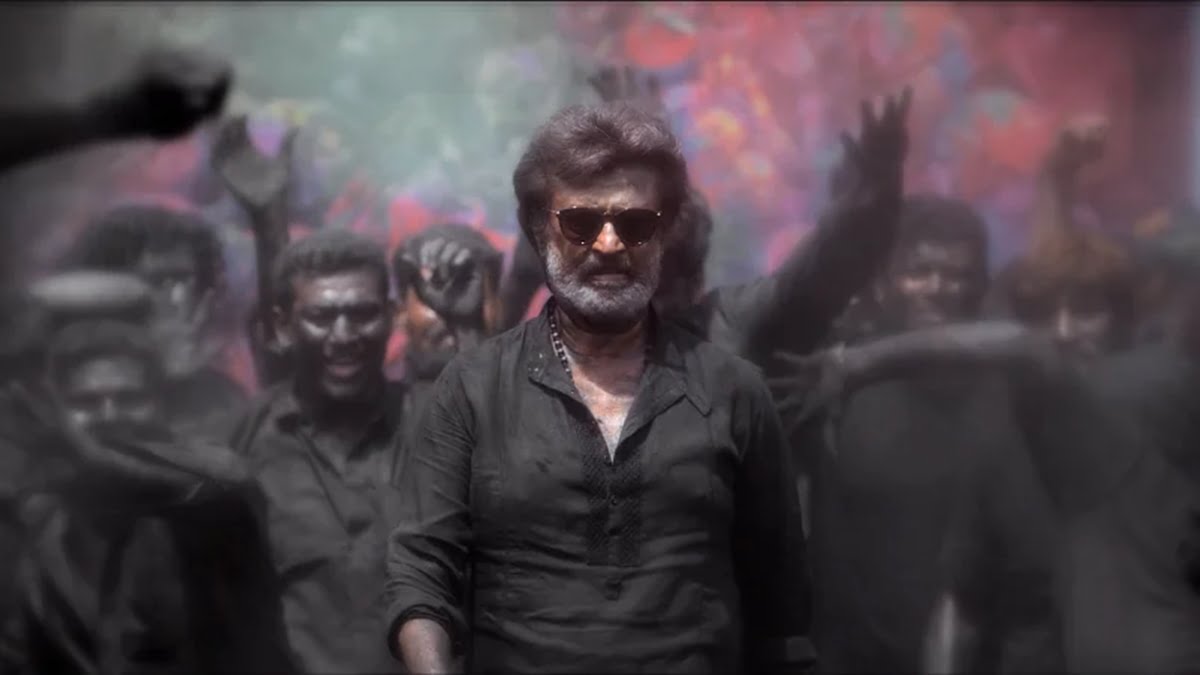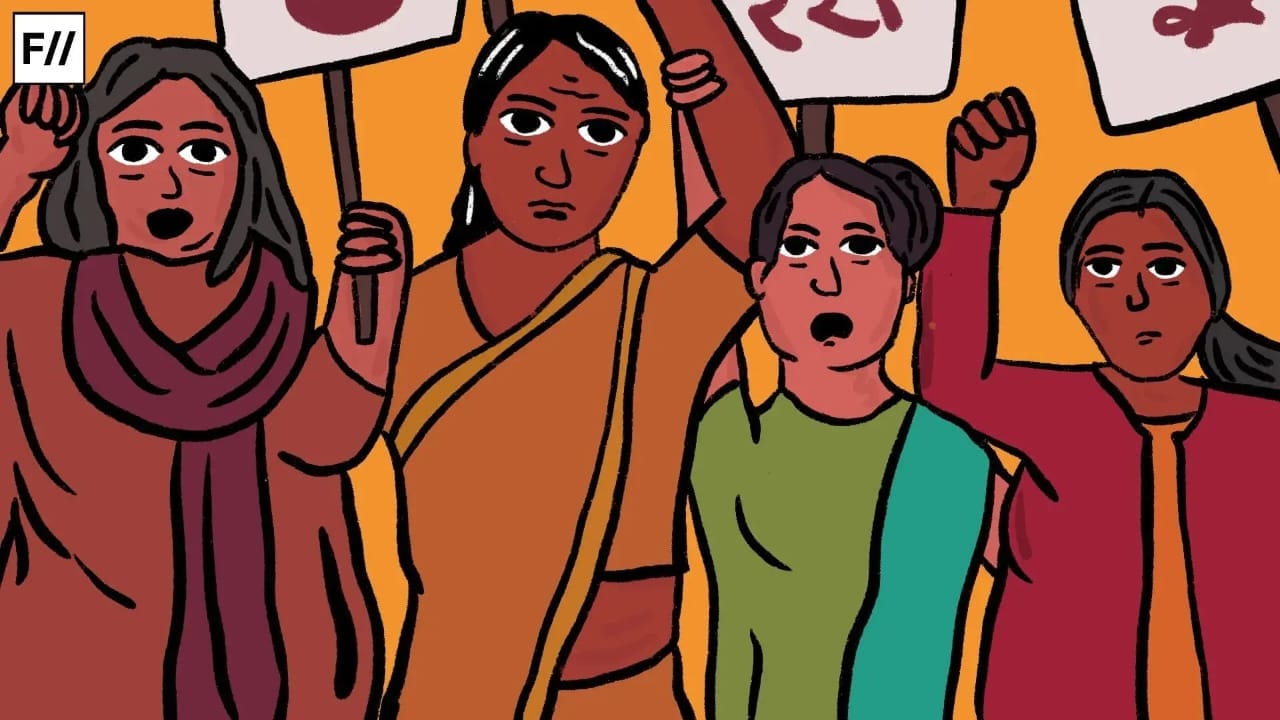I was told that I should watch Kaala, the Rajinikanth starrer that was directed by Pa Ranjith. I have read several reviews about the blockbuster. You’d want to think there are mixed reviews and the movie is just another ‘Rajini-fied’ commercial movie, but there is a strong anti-fascist message here. It was finally the words of my mentor that made me watch the movie: “rasichchi rasichchi paakkalaam, avlo irukku andha padathula” (there’s so much to admire in the movie that you’d love watching). Yes, I did enjoy the movie, and Rajini-ism was not one of the top reasons.
Also read: Kaala And Its Triumphant Subversions Of Caste And Gender Roles
The setting of Kaala primarily shows Tamilians who migrated decades before as living together in a densely populated slum in Dharavi in unhygienic, unhealthy, and poor living conditions. Karikaalan aka Kaala, who is seen by the slum dwellers as their protector, guide, and supporter for a long period is living there with his wife Selvi (played by Easwari Rao), brother-in-law, four sons, daughters-in-law, and grandchildren. Hari Dhadha (played by Nana Patekar) is a power-hungry, cruel politician who tries to destroy the slum to construct new buildings to gain more power, and he is challenged by Kaala and his people who argue that it’s their right to live there. Kaala’s ex-girlfriend Zareena (played by Huma Qureshi), with whom Kaala shares beautiful memories from the past, comes back to the slum as a single mother, after having lived in different parts of the world, as a social worker that wants to improve the standard of living of the residents in her birthplace. The struggle for land between the protagonist and his people and the antagonist and what price they pay is what the movie is about.
To sum it up in a sentence, Kaala shows a justifiable fight against oppression, a fight put up by the slum dwellers in Dharavi against fascists. The director, Pa Ranjith is known for strong anti-oppression message and politics. The oppression is highly realistic, not at all exaggerated, the fight is inspiring, the acting by most actors does justice to the characters, the music by Santhosh Narayanan amps up the Rajini charm and also goes well with the narrative, and what I liked the most was how absolutely direct the story is, no soft touches, which is again, characteristic of Pa Ranjith. A win against fascism is a win for all of us, so yes, I did enjoy the movie. Now, to move on to what’s patriarchal about the movie.
The ex-girlfriend Zareena coming back and the man flaunting his heroism
A hero with a wife and an ex-girlfriend on the scene, with one of them being the innocent, committed woman the hero marries and the other being the independent woman that’s highly aware of herself and the world around her is an overused template in Tamil/Indian cinema. This binary is dead boring, yet the largely male audience of such cinema still seems to love it because it satisfies their narcissistic side. When the hero feels love for two women at the same time in movies, that is normalised. When the hero overcomes his love for one to remain true to the commitment he made to the other (his wife), that makes the hero a loving, gentlemanly husband. Either way, the hero is, well, … “heroic”! How many movies can you think of, that are blockbusters, where the female lead has to face her ex and her then husband at once, where the attention is given to the woman’s feelings for both men at once, without the director diverting the attention quickly to one or both men again? Women’s emotions are shown only to show the hero as lovable, but beyond that, it’s always the man’s feelings that are in focus.
How many movies can you think of, that are blockbusters, where the female lead has to face her ex and her then husband at once, where the attention is given to the woman’s feelings for both men at once, without the director diverting the attention quickly to one or both men again?
The tattoo, which is not necessary for the plot in any way
Taking forward from the earlier point, even the coming back of the ex-girlfriend was not necessary for the plot (if you really wanted a character that was born and raised in the slum, travels around the world, then comes back to support the slum dwellers, the character could be a man, but we specifically need an unmarried woman, to show how the hero had a love history? Okay.). While it is a win for women empowerment in a uni-dimensional way, it mostly is employed in the movie to add a layer to Kaala’s character.
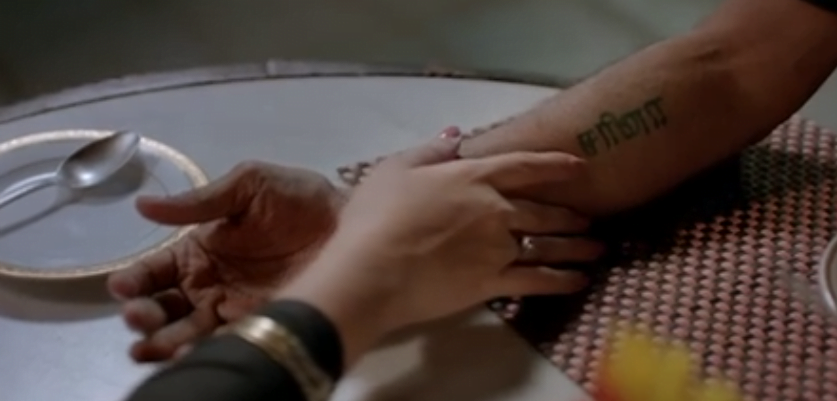
Kaala has “Zareena” tattooed on his hand, when he’s happily married to Selvi. So all these years, Selvi had to wake up to, go to sleep beside, and make love to her husband who still has his ex-girlfriend’s name tattooed. Oh yeah! Women, especially wives, are not expected to complain because that’s what “good women” do. How acceptive will the audience be if Selvi had a tattoo on her forehead of her ex, while living with her husband? Blasphemous, right? Thought so. Further, the movie focuses on layering the character of Kaala and not deep dive into Selvi’s history. Did she have a lover too? Who cares? Definitely not a predominantly male-centric audience.
Here’s requesting you, Ranjith, to please show us a superhero that does not occupy centerstage when the heroine’s ex comes back and the two of them enjoy their own time together with a song to show how many beautiful memories they share.
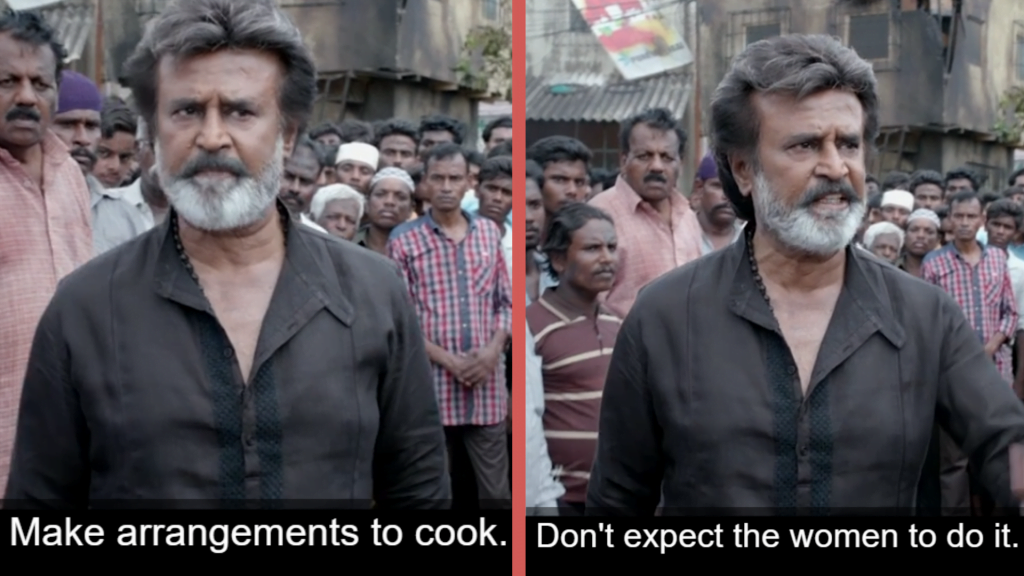
Only Women Belong To The Kitchen, Even In Our Progressive Hero’s House
When they all decide to hold a strike as suggested by Kaala, the hero walks through the crowd giving instructions, coolly telling the men to cook, warning the men to not say that cooking is something that only women must do. And … ironically, in Kaala’s home, cooking is women’s duty. In the very beginning, when the characters in Kaala’s family are introduced one by one, Selvi and two ladies are seen cooking in the kitchen, one man (someone Selvi describes as greedy for money) is seen sitting in a cabin and counting rupee notes, one son is sitting at the dining table where his wife feeds their child, another son sits outside receiving a massage from his wife, and outside their home, Kaala and his brother-in-law are seen having some chit-chat, when the youngest son arrives after a day of working for his cause.
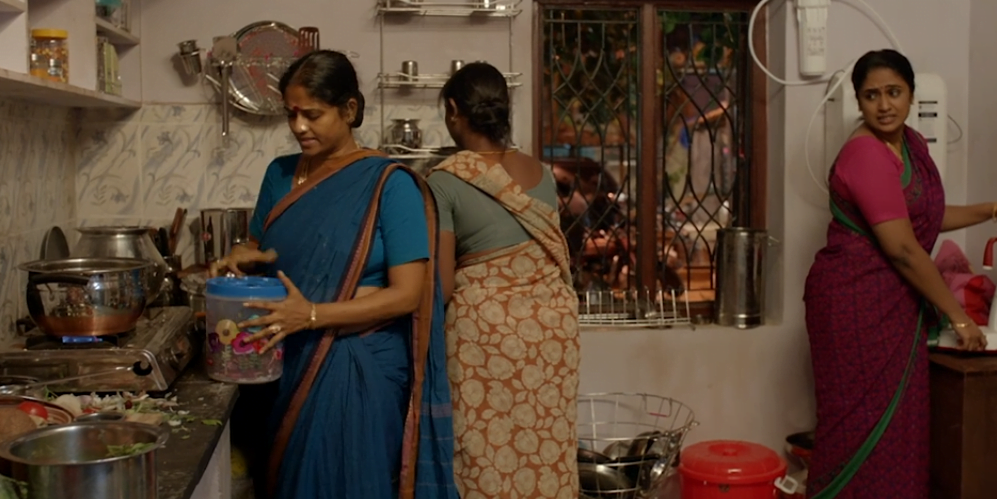
Women are also shown as labourers and workers in the slum, so they don’t work in just their households, interesting. And the great “Otha Thala Raavana” (one-headed Raavana) Kaala is not seen participating in any kind of household chores like cooking or doing the dishes or feeding the children anywhere in the movie. Easy to preach (at the strike), but difficult to practice? How, how, just how could a cis-het man, a hero, someone Rajini-ish get into a kitchen? Sigh! Dhillirundha kitchen kulla pongadaa! <wink> (Translation: “If you have the courage, go into the kitchen, guys!”)
When Kaala’s youngest son, Lenin cries out of disappointment and frustration because he feels defeated in his fight for the people’s rights as Kaala opposes his views, saying he’d leave their home, the young man’s brother, his uncle, father, and even mother mock him and shame him. We all know what would be the case had Kaala’s daughter cried and said something similar. The father would be shocked, there would be flashes of memories, and the rest of the family would compel her to stay with them, and if she would agree, they would ‘forgive’ and accept her. But sons don’t deserve that empathy, right? Real men don’t cry, you mean? (Absolutely not) Cool! It’s because of patriarchy that every man around you is afraid to openly express his emotions.
Also read: Film Review: ‘Soorarai Pottru’ Celebrates Strong And Bold Womanhood
Because there are a few female characters that are shown as brave, outspoken, and daring, you want me to believe that there is gender equality in Kaala? Oh well! That’s breadcrumbs, and that is all that Tamil cinema/Indian cinema has been giving the audience for eons now.
Because there are a few female characters that are shown as brave, outspoken, and daring, you want me to believe that there is gender equality in Kaala? Oh well! That’s breadcrumbs, and that is all that Tamil cinema/Indian cinema has been giving the audience for eons now. Yes, Puyal, Lenin’s girlfriend puts up a fight whenever the oppressors provoke her, and Zareena is educated, has been a social worker and reformer, and has travelled around the world. But how many women are allowed to make decisions, how many have the power to? Most of the important decisions are made by the hero Kaala or the villain Hari Dhadha.
I, like you do, oppose fascism in the name of Ram, but when it comes to patriarchy, how different are Ram and Raavan, either in history or today?
Featured Image Source: YouTube
About the author(s)
Lakshmi Prakash is a psychotherapist and writer that loves behavioural sciences and everything out of syllabus. Annoying her is easy: tell her to conform. Befriending her is easy: crack silly jokes (the sillier your joke, the louder her laugh). She can be found on Facebook, Instagram and Twitter.
